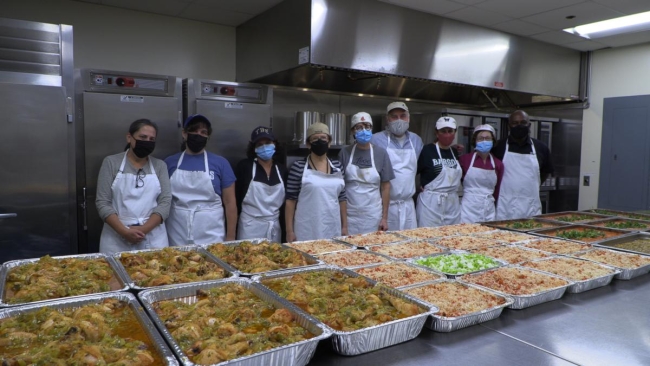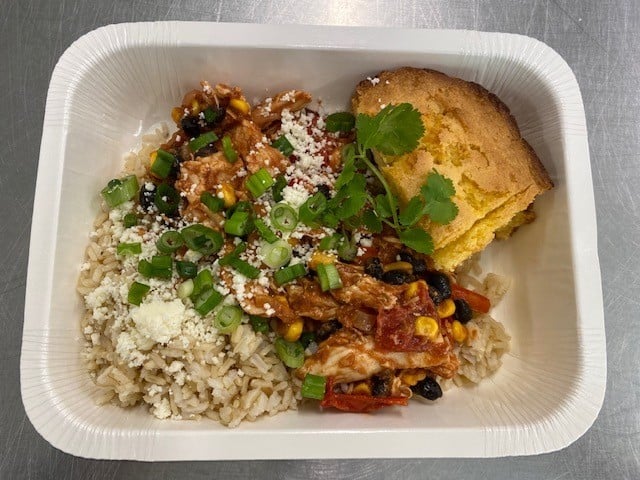You have /5 articles left.
Sign up for a free account or log in.

Temple Beth Elohim volunteers
TBE Table
For three nights every other week, congregants at Temple Beth Elohim gather in the synagogue’s kitchen to discuss menus, chop heaps of vegetables and season tins full of chicken, which they will turn into fully prepared meals for their neighbors a couple of miles away at MassBay Community College.
The volunteer workers cook, package, freeze and deliver 120 meals every two weeks to the campus in Wellesley Hills, a Boston suburb, as a part of a new partnership between the synagogue and the college, which then distributes the meals for free to students who need it.
The campus meal program was started this semester by volunteers from TBE Table, a program begun by the synagogue during the pandemic as economic hardship became a dominant theme of the public health emergency and reports spread of people losing their jobs and going hungry. The effort was inspired by a local church leader who started a free meals program and urged other faith leaders to do the same. When the programs organizers at Temple Beth Elohim started hearing stories about community college students not having enough to eat, they reached out to campus administrators and offered to add students to the list of local residents and community groups to whom they provide meals.
The congregants wanted to work with MassBay, whose campus they viewed as an extension of their community, “because they’re in our backyard and because we knew over the course of the pandemic that students at community colleges in particular are experiencing very high rates of food insecurity,” said Barbara Turk, a volunteer who helps prepare meals at the synagogue. “As long as we can feed them, as long as they don’t have to worry about where their meal is coming from or how to feed their kid a couple times a week at least, they can focus on their studies, on graduating, getting good jobs, getting a better pay … It just feels very worthwhile.”
Students can fill out an online form and receive up to five meals per week from the synagogue. Since the partnership began Feb. 1, at least 60 students have taken advantage of the new meal option, though administrators expect that number to grow. Some 271 meals have been distributed so far.
College leaders eagerly accepted the synagogue’s offer of help. At least 52 percent of the MassBay student body is food insecure, and those percentages are even higher for certain groups of students: 55 percent of female students and 75 percent of Black students report struggling with food insecurity, according to a recent survey of MassBay students conducted by the Hope Center for College, Community and Justice at Temple University, which researches student basic needs insecurity. Meanwhile, 82 percent of students work full-time, about half receive financial aid, 35 percent are first-generation college students and almost half are responsible for caring for family members.
“The idea of a neighbor helping us out felt very powerful,” said Elizabeth Blumberg, vice president of student development and dean of students at MassBay.
The community college has a number of ongoing efforts to combat student hunger, coordinated by the Student Nourishment and Care Committee, or SNACC, a group of students, community volunteers, staff and faculty members that formed in 2015 to tackle basic needs insecurity among MassBay students. There are plastic bins full of granola bars, crackers, oatmeal packets and other snacks stationed around campuses. The Framingham campus gets containers of soup for food-insecure students through a local nonprofit called Daniel’s Table. The college also launched a partnership with a local grocery store this fall where students who apply can pick out up to $80 worth of groceries every other week. Last semester, 206 students got groceries this way.
All these efforts combined only meet a fraction of student need, but Blumberg said partners such as Temple Beth Elohim help supplement the college’s existing programs and bridge some of the gaps in support.
David Koppisch, associate director of community engagement at the Hope Center, said colleges and universities often draw on these kinds of local partnerships for support, including with faith communities, to address hunger and housing insecurity among students. For example, Millersville Community United Methodist Church runs a program called The Hub to feed hungry students at nearby Millersville University in Pennsylvania. Nazun, a multicampus Jewish student organization, formerly known as Challah for Hunger, bakes and sells bread to raise money for food-insecure students.
Trinity Church, the historic Lower Manhattan institution in New York City, recently gave a grant to Borough of Manhattan Community College to provide homeless students housing.
“We’re definitely seeing this more and more, which is great,” Koppisch said. “We know that there are gaps in service. There are some holes in the safety net that colleges are doing what they can to fix but sometimes can’t do it all, but here are all of these community groups in most cities, most towns that are there that know how to address food insecurity or housing issues or other kinds of things, so why not bring them to the table?”
Atif Qarni, managing director of external affairs at the Hope Center and a former Virginia secretary of education, said these partnerships are to be celebrated and encouraged, but broader, longer-term policy solutions are critical to address hunger among community college students.
The goal is “systemic change,” and that means “the local, state and the federal government are stepping up to inject more resources for students in need,” he said. He noted that not all community colleges have faith communities nearby with the resources to help feed their students.
Qarni noted that the U.S. Department of Education announced in January an additional $198 million in COVID-19 relief funding for community colleges and other institutions serving low-income students to support their basic needs.
“We would like to see that grow and not just be a one-time thing,” he said.
He also wants to see state and federal policy makers addressing the high costs of college.
He added that faith communities can be “strategic partners” to colleges and their food-insecure students, not only through food and housing initiatives but by advocating for policy change.
Some policy makers have strong relationships with faith leaders, and “when they hear from their faith partners, their pastors or imams or their rabbis, they do tend to listen,” he said. “So I think that we can leverage them strategically to advocate for basic needs insecurity and securing more government resources.”
Blumberg agreed that community colleges often lack the resources to meet their students’ food needs.
“At the end of the day, community colleges are funded at a much lower rate than our state sister institutions, the four-year colleges,” she said. “More of our students go to community colleges, and yet we have less money … If we had more funding, we would be able to do more meals, we’d be able to do more delivery services. There’s so many more things we could do if we had additional funding.”
Joel Sisenwine, senior rabbi at Temple Beth Elohim, said the meals are meant to help students “focus on their studies as they continue on their path to success.”
“This program is closely aligned with our value of comforting and caring for our community,” he said in a press release.
Blumberg emphasized that students’ academic progress hinges on their ability to access good meals. She expects the TBE Table meals to improve student retention and academic success, which has been the case for other food programs run by the college. For example, in fall 2019, the college provided scholarships to 48 students to spend on meals. Their average GPA rose from 3.09 to 3.12 after they received the funds, Blumberg said. In contrast, students who were eligible for a scholarship but didn’t receive one because of a lack of available funding saw a decrease in their average GPA from 2.90 to 2.53. In spring 2020, 70 students received meal scholarships, and those students returned to MassBay the following semester at a rate 21 percentage points higher than the overall retention rate.
“I truly believe their ability to concentrate and focus is supported by the food that they’re getting,” she said. “It’s that empowerment piece—they’re not having to worry, they’re not distracted, they just had a great meal and they’re back into math class.”
Turk, the Temple Beth Elohim volunteer, said the meals are also intentionally designed to be healthy, with fresh vegetables and protein, and volunteers want them to look appetizing.
“It’s really tasty; it looks beautiful,” said Turk. “Presentation is so important because we want people to feel valued and to feel respected. They’re not just opening up a box of mac and cheese. They’re really getting a restaurant-quality meal, which I think makes a difference for people. Nobody wants to feel like they’re getting somebody’s secondhand food.”
Blumberg noted that the form students fill out to receive meals asks them their favorite foods, which synagogue volunteers consider when they plan menus. Past meals have included vegetable lasagna and pulled chicken with black beans over brown rice with corn bread.
The volunteers don’t just want to feed students, she said. “I think they really want to connect with our students and help them enjoy their food and look forward to it.”
For her, one of the advantages of offering meals through a community partnership versus options like an on-campus food pantry is that personal touch. She believes it reduces stigma.
“When a student feels bad, when they don’t have enough money, it impacts them psychologically, emotionally, and I think it has an impact on their ability to perform academically,” she said. “But if they just grab that granola bar or they get that Temple Beth Elohim meal, there’s just a lot less shame connected with it. And I think it’s just increasing their energy and their zest and their desire to learn and be successful.”





